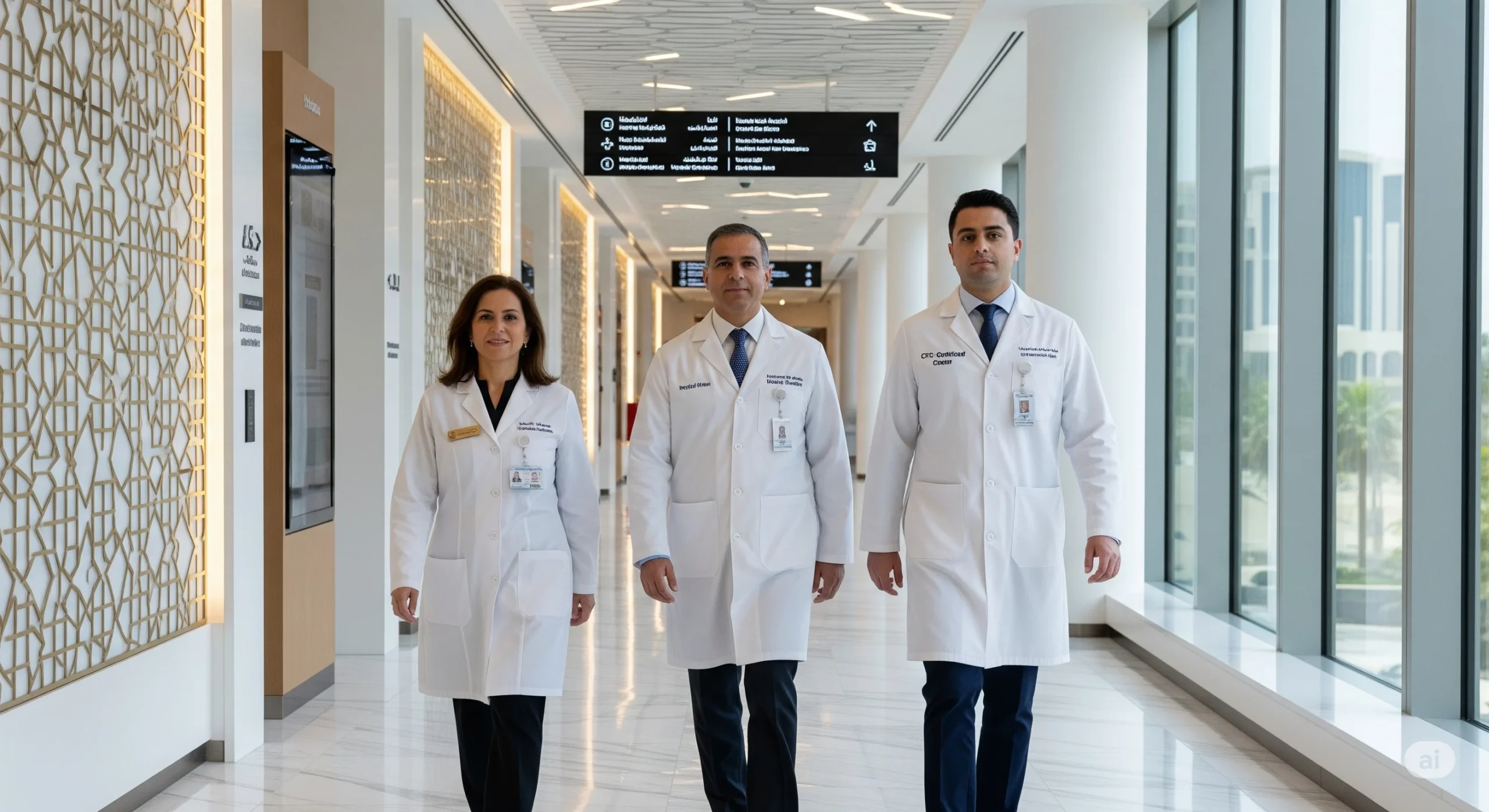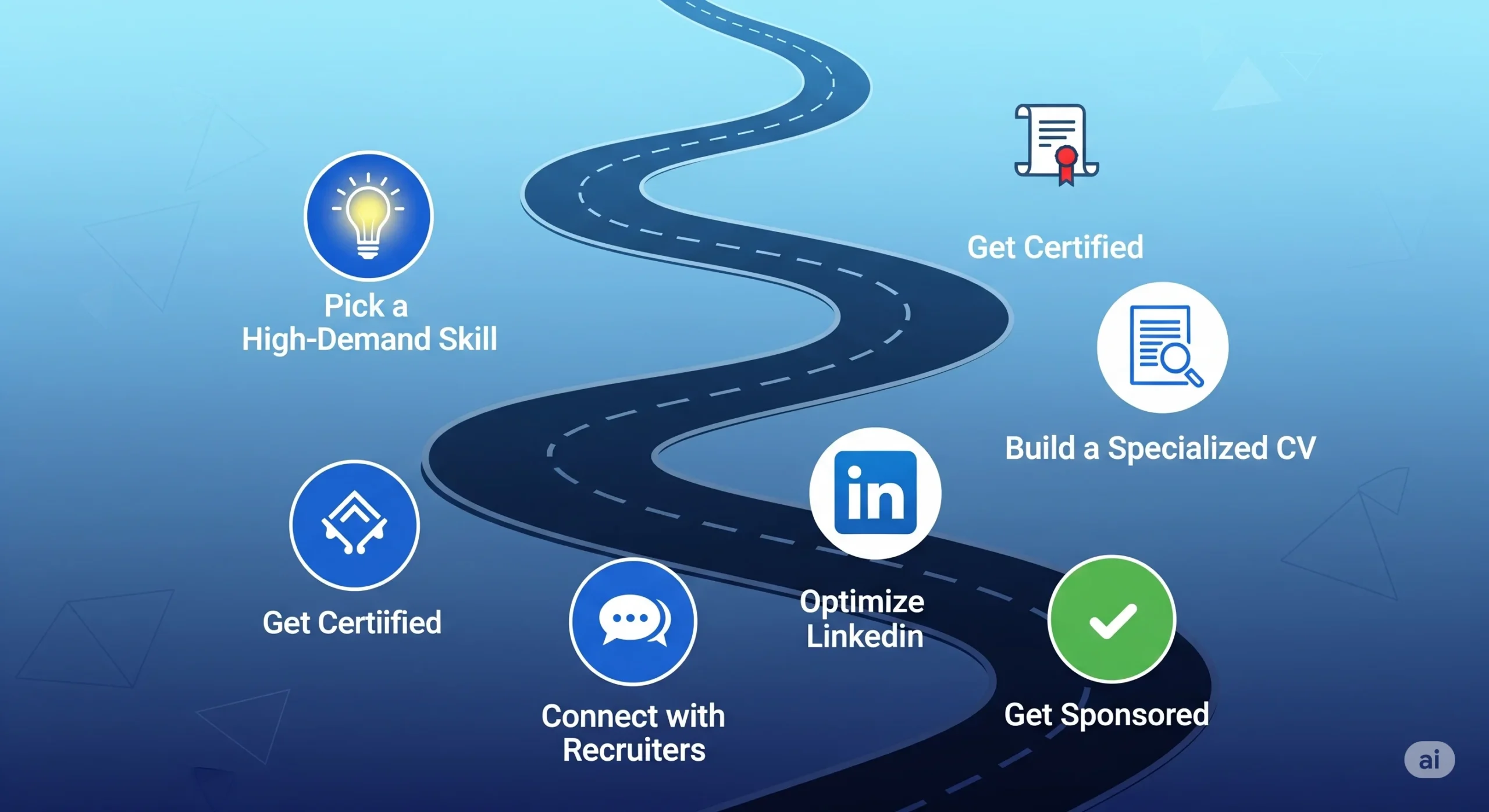
Dubai & KSA: The Truth About Visa-Sponsored Job Openings in 2025
Getting a visa-sponsored job in Dubai or Saudi Arabia is a life-changing dream for millions. The vision of a tax-free salary, a world-class lifestyle, and a dynamic career is a powerful motivator. But lately, the online chatter has been filled with rumors and rejection stories. You’ve probably heard it’s getting harder, that the ‘golden age’ is over, and that companies are no longer hiring from abroad. Is the door closing for foreign talent?
The door isn’t closing, but the lock has changed. This guide will show you the unvarnished truth: while generalist, mid-level roles are increasingly reserved for local talent, a new, more exclusive door has opened. Gulf companies are now paying a massive premium and fast-tracking visas for a very specific set of world-class skills that are critical to their future. This isn’t about just finding a job; it’s about becoming an essential asset they can’t find locally.
The New Reality: Why Companies Are Hiring Differently
To succeed, you need to understand two major forces. First, Nationalization programs, such as ‘Saudization’ in KSA and ‘Emiratisation’ in the UAE, are a top government priority. These initiatives are successfully placing talented local citizens into important roles in HR, administration, marketing, and general management. Sending a generic CV for these types of jobs from abroad is now less effective than ever before.
This creates a paradox. While hiring for general roles has become localized, the region’s explosive growth—fueled by giga-projects like NEOM and a multi-trillion-dollar push into technology and finance—has created a massive, critical shortage of elite, specialized talent. There simply aren’t enough local experts with 10+ years of experience in niche fields like AI development or renewable energy engineering. For these jobs, companies are more aggressive than ever in sponsoring the best international talent they can find. They are not just offering a job; they are acquiring a critical human asset.
Opportunity Zone 1: The Giga-Projects (Construction & Engineering)

The Need: Projects like NEOM, the Red Sea Global development, and various Expo 2020 legacy projects in Dubai are some of the most ambitious engineering undertakings in human history. Entire cities are being built from scratch. This requires a scale of specialized expertise that no single country possesses, creating huge opportunities for international experts.
The Sponsored Jobs (The “Must-Haves”):
- Elite Project Leadership: Companies are desperately seeking Project Directors and Senior Construction Managers who hold the PMP® (Project Management Professional) certification. For many multi-billion dollar projects, this is not just a preference; it is a mandatory requirement to prove you can manage the scale and complexity involved.
- Sustainability & Energy Experts: These new cities are being designed to be sustainable, creating huge demand for Renewable Energy Engineers with a background in solar or wind, Sustainability Consultants, and MEP (Mechanical, Electrical, Plumbing) Engineers who have experience with green building technologies.
- Niche Infrastructure Specialists: There is a high need for Specialized Civil Engineers with a proven portfolio in specific areas like high-speed rail development, international airport construction, or the design of large-scale desalination plants.
What You Need to Prove: A generic engineering degree is not enough. Your CV must showcase a portfolio of managing large-scale, complex projects. You must quantify your achievements, for example: “Managed a $500M infrastructure project from conception to completion, finishing 10% under budget.”
Opportunity Zone 2: The Tech Boom (AI, Cybersecurity, Cloud)
The Need: Dubai and Riyadh are in an all-out race to diversify their economies away from oil and establish themselves as global technology hubs. Billions are being poured into AI, fintech, and e-commerce, but the local educational systems have not yet produced enough senior-level tech talent to fill the thousands of new, highly specialized roles.
The Sponsored Jobs (The “Digital Bedrock”):
- AI & Data Science: Companies are fast-tracking visas for AI/Machine Learning Specialists and experienced Data Scientists. These are the professionals building the “brains” for the new smart cities and advanced financial systems. Specific skills in Python, TensorFlow, and Natural Language Processing (NLP) are in very high demand.
- Cybersecurity: With every new digital system come new vulnerabilities. Cybersecurity Experts, especially those holding the globally respected CISSP® (Certified Information Systems Security Professional) certification, are being hired at a premium to protect critical national and corporate infrastructure.
- Cloud Architecture: Over 85% of companies in the region are moving their operations to the cloud. They need certified Cloud Solutions Architects with professional-level credentials from AWS, Microsoft Azure, or Google Cloud to design, implement, and manage this complex transition.
What You Need to Prove: A computer science degree is just the starting point. To get noticed for these elite roles, you need a GitHub profile with real projects, a portfolio of detailed case studies, or advanced, globally recognized certifications.
Opportunity Zone 3: Elite & Specialized Healthcare

The Need: The Gulf region is investing heavily to become a global center for world-class medical tourism. State-of-the-art hospitals and clinics are being built, but these facilities are useless without the elite medical talent required to run them. There is a significant shortage of highly specialized, Western-trained medical professionals.
The Sponsored Jobs (The “Life Savers”):
- Specialist Doctors: There is extremely high demand and visa sponsorship for Consultant-level Doctors, particularly in complex fields like Cardiology, Oncology, Orthopedic Surgery, and Anesthesiology.
- Healthcare Leadership: These new facilities need experienced Healthcare Executives, Hospital Directors, and Chief Medical Officers who have a proven track record of managing large, complex medical facilities and maintaining international standards of patient care.
- Specialized Allied Health: Niche roles that support the new complex medical systems are also seeing increased demand for sponsorship. This includes experienced Medical Coders (with CPC certification) and Healthcare IT Specialists.
What You Need to Prove: Your credentials must be impeccable and often need to be attested by specific authorities like the DataFlow Group. Experience working in a leading hospital in the US, UK, Europe, or another highly developed healthcare system provides a massive advantage.
Your Strategy: How to Become a “Sponsored” Candidate

Stop Applying, Start Specializing: The single biggest mistake is mass-applying to generic ‘Manager’ or ‘Administrator’ jobs with a standard CV. This is a waste of time. Your new strategy is to become a specialist. Pick one of the high-demand skills or certifications mentioned above and focus all your energy on it. Your goal is to make your CV so specialized that a recruiter looking for that exact skill cannot ignore you.
Target Your Search Like a Recruiter: These elite jobs are often not on public job boards; they are filled by specialized headhunters. Your new job board is LinkedIn.
- Optimize your LinkedIn headline to be your target job title (e.g., “PMP Certified Project Manager | Giga-Project Specialist”).
- Follow the company pages of NEOM, Red Sea Global, major hospitals like Cleveland Clinic Abu Dhabi, and top tech firms in the region.
- Connect directly with recruiters who have “Technical Recruiter” or “Executive Search” in their titles and are based in Dubai or Riyadh. Engage with their posts professionally. This is how you get on their radar for unadvertised roles.
Conclusion
Getting a sponsored job in the Gulf in 2025 is no longer about just being good; it’s about being essential and irreplaceable. The companies are not sponsoring roles they can fill locally; they are sponsoring roles they cannot. By becoming an expert in one of these critical talent gaps, you don’t just find a job—you become the prize.






